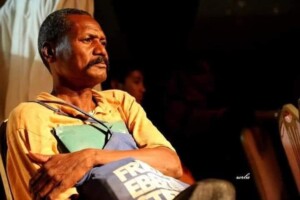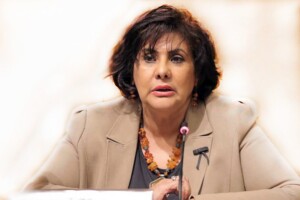Condemnation as new political initiative calls for army to be ‘supreme authority’ in Sudan
The mainstream Forces for Freedom and Change, the Central Council faction (FFC-CC), condemn the Sudan People’s Call initiative as anti-democratic and call it “an attempt to turn back the clock” that allows the military to control Sudan’s politics.
 The inaugural ceremony of the Sudan People's Call conference (social media)
The inaugural ceremony of the Sudan People's Call conference (social media)
The mainstream Forces for Freedom and Change, the Central Council faction (FFC-CC), condemn the Sudan People’s Call initiative as anti-democratic and call it “an attempt to turn back the clock” that allows the military to control Sudan’s politics.
The Sudan People’s Call initiative, backed by coup-leader and Sudanese Armed Forces (SAF) commander Abdelfattah El Burhan, was launched last month by renowned Sufi leader El Tayeb El Jad with the aim of ending the country’s political crisis.
This weekend, a conference took place with a round table dialogue and resulting recommendations. The conference recommended that the High Council of the Armed Forces, as proposed by Gen Abdelfattah El Burhan on July 4, be given broad authority, including sovereign powers, so that it will be the supreme authority in the country.
El Wasig El Bereir, Secretary-General of the National Umma Party (NUP) and spokesperson for the FFC-CC, said that the initiative is “an attempt to turn back the clock and tame the revolutionary political forces that believe in democratic transformation by a force that defends the military coup. The military will work from behind the curtain to guide them in the directions they want”.
El Bereir noted that the Sudan People’s Call initiative, from the beginning, defined the crisis in Sudan as a conflict between groups of civilians. While the real crisis, he said, is caused by the October coup “which blocks the path to a genuine civilian-led democratic transformation”.
'The military will work from behind the curtain to guide them in the directions they want' – El Wasig El Bereir (FFC-CC/NUP)
El Bereir stated that his party “will not be part of any attempt to quell the glorious December revolution and ignore the demands of the Sudanese people”.
The parties that were invited to the two-day conference of the Sudan People’s Call this weekend were the ones that supported the 1989 coup under the leadership of Omar Al Bashir and the October 25 coup.
The FFC-CC said they had not been invited to take part in the conference. The FFC-NA (National Accord) faction*, dominated by former members of rebel movements, declined the invitation.
In response to the appearance of some of its members at an earlier meeting of the Sudan People’s Call, the Sufi El Gadiriya group distanced itself from the initiative.
“The Gadiriya order did not send delegates to this initiative. The people called Adel El Bashir and Sheikh El Sadig Khaled Abbas only represent themselves,” the order said in a statement earlier this month.

Recommendations
The round table conference mainly involved the dignitaries of the former regime from the banned National Congress Party (NCP) and their allied groups. All of them hailed the October coup and expressed their political support for the military leaders who they perceive as their ‘saviours’.
The conference concluded by making several recommendations for the transitional period in which the military will be granted far-reaching powers.
“The conference defined the structures of the transitional period so that the High Council of the Armed Forces is the supreme authority entrusted with defending Sudan and its people, protecting national security and constitutional order, as well as assuming sovereignty duties”, according to the final communiqué read at the closing session.
A cabinet of technocrats is to assume executive duties. Also, the conference refused the appointment of Sudanese holding a foreign nationality as prime minister.
The conference further recommended the termination of the mandate of the UN Integrated Transition Assistance Mission in Sudan (UNITAMS), which has in the past been blamed by military authorities for ‘interfering’ with Sudan’s politics too much.
Ignoring political and legal reforms, the conference encouraged speeding up the electoral process to elect a legitimate government.

Other negotiations attacked
A workshop on arrangements for a transitional constitutional framework launched by the Sudanese Bar Association (SBA), which saw widespread participation from members of the Forces for Freedom and Change (FFC) and the Democratic Unionist Party (DUP), was attacked by supporters of former dictator Al-Bashir’s regime.
That workshop, which also aimed to end the political crisis and brainstorm about the contents of a transitional constitutional framework, concluded with a set of recommendations that stressed distancing the military from politics.
Suspicion and scepsis
After the military announced its withdrawal from politics, many reacted with scepsis and suspicion.
At the time, Omar El Degeir, head of the Sudanese Congress Party, described the speech as “a generalisation, attempting to camouflage the military’s real intentions and to create confusion”. The decisions by the military “aims to fully seize sovereign power in Sudan and to keep holding the strings of the game,” he stated.
“The speech did not touch anything with regard to the revolution's demands, such as a unified professional army, the transfer of economic institutions owned by the military to the Ministry of Finance, in addition to issues of justice, the economy, and people's livelihood”.
Resistance Committees considered the decision an attempt “to aim to gain more dominance and control by the military over security issues, the economy and foreign relations”.
'The military aims to fully seize sovereign power in Sudan and to keep holding the strings of the game' – Omar El Degeir (SCP)
At the time, El Burhan proposed a High Council of the Armed Forces formed by commanders from El Burhan’s SAF and from the Rapid Support Forces (RSF). which are commanded by Deputy-Chairman of the Sovereignty Council Mohamed Hamdan ‘Hemeti’ Dagalo, “to assume the supreme command of the regular forces and be responsible for security and defence tasks, and related responsibilities”.
Both El Burhan and Hemeti are responsible for the October 2021 military coup.
On social media, the reactions by activists were sceptical too. “El Burhan’s speech is a testimony to mounting popular pressure but in substance it’s simply the snake changing its skin. While pretending to exit politics, the army is creating a defence council of SAF and RSF controlling the coercive power of the state with no civilian oversight”, one wrote.
Sudanese are now preparing for new Marches of the Millions on August 18 to overthrow the coup regime.
* Last year, a group dominated by members of former rebel movements split off and formed the FFC-National Accord faction. The faction, also known as the National Accord Forces, is chaired by Mubarak Ardol, the former spokesmen for the Sudan People Liberation Movement-North, who became director of the Sudanese Company for Mineral Resources with friendly ties to the then-ruling National Congress Party of dictator Omar Al Bashir. Sudanese social media activists regularly call someone whom they consider a defector from the revolutionary course or any politician they do not trust ‘Ardoli’ or ‘Ardolian’.











 and then
and then